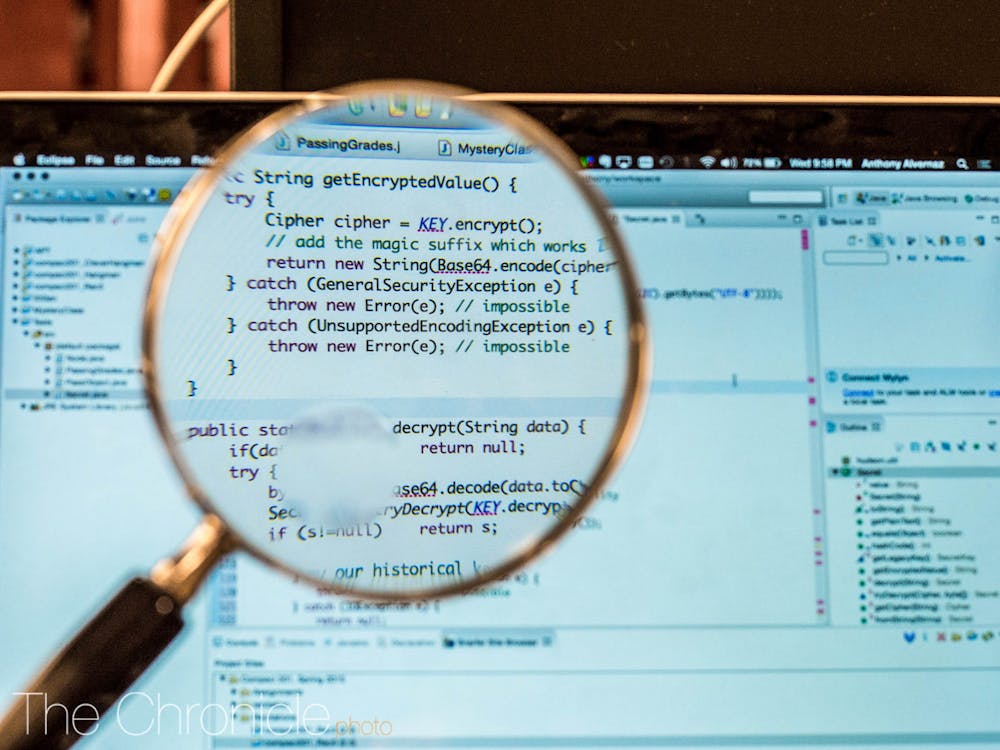
There is a new computer science class offered this fall, and it’s not like any other course in its department.
Race, Gender, Class, & Computing aims to restructure students' views of computer science and technology to include lessons of equity and inclusion.
“The problems in technology don’t begin with the technology—they begin with the environment where people are learning and working, and we have to find ways to bring that to attention,” said the course’s designer and instructor Nicki Washington, professor of the practice of computer science.
The course is structured so that the first half tackles topics in race, ethnicity, gender, sexuality, class, ability and religion, designed to help students form a foundational understanding of identity. The latter half then looks at how these identities are impacted by various technologies.
“We just discussed facial recognition technology, and how people with darker skin tones are not properly recognized,” Washington explained. “In the short term, if I walk in front of a sensor, it may not sense me. If I’m on camera, then there’s a high likelihood that the image of me will be inaccurate. What does this mean? This means there’s a likelihood I could be falsely accused of committing a crime. We look at examples in the news where we see Black men who have been falsely arrested due to inaccurate facial recognition technology.”
This is Washington’s first semester at Duke. She explained that she first pushed for the creation of this course at her previous institution, Winthrop University, but was unable to get it established.
Although she was initially planning on teaching Computer Science 101 in the fall, followed by this course—Computer Science 190—in the spring, these plans were quickly changed following recent events.
After the killing of George Floyd in May, Washington “received separate emails from the outgoing and ingoing chairs that said it would be really valuable and important to roll out the class in the fall,” she said.
“I’m grateful that there was no push back from Duke. In fact, there was a lot of gentle nudging for it,” she said.
The course was listed as a “special topics” course because of the quick timeline for getting it into the system, but it will be applied for permanent course status after the spring semester, and Washington plans on teaching it again.
Washington is also spearheading a professional development program from February to June to help faculty who want to create courses like hers or incorporate new modules into their pre-existing classes.
“For a long time, there has been a big hindrance for courses like this because people say, ‘It’s not theoretical computer science, so why are we worried about this?’ because it belongs in social science. But social science is telling us that the things we’re creating are problematic, so if we’re not talking about them, we’ll continue creating the problems,” she said.
Get The Chronicle straight to your inbox
Signup for our editorially curated, weekly newsletter. Cancel at any time.
Junior Micalyn Struble, who is a computer science minor, shared her overwhelmingly positive experience with the course thus far.
“I was in a Bass Connections last year about how to add ethics into the engineering curriculum. We were looking at Aristotle and Kant, while [Washington] creates a foundation about who is being impacted and who is being left out of the story. Her approach is more human-centered, and honestly it’s much better than what we were trying,” Struble said.
Struble praised the class for its safe-space nature where students feel comfortable to ask questions, as well as its unique teaching style. For example, they start every class with a piece of music related to the day’s topic.
It is “maybe the most diverse class I’ve been in at Duke,” said Struble. “It should be required for all Duke computer science undergraduates.”
Junior Alex Chao is another student in the class. He is a computer science and African American studies double major and said that this course is exactly what he’d been looking for.
“I got an email about it maybe the day before registration and thought, ‘I need to take this class,’” Chao said.
“I'm really interested in how quantitative computer science thinking and a humanities lens inform each other, and they usually operate very separately in academics majors,” Chao said. For students like Chao, this course works to bridge the gap between the two disciplines.
A particular aspect of the course that Chao appreciates is its participation metric. “There is no participation grade within class time, which firstly takes pressure off for students who aren’t as comfortable or people who can’t make the synchronous class time, and secondly makes the participation higher quality because people talk when they actually have something meaningful or interesting to say,” Chao said.
Chao agreed with Struble that the course is more diverse than usual.
“There is a wild disconnect between the demographics of the computer science major and the demographics of this class,” said Chao. “While computer science at Duke is very white, male and East Asian, our class is not that.”
Washington, Struble, and Chao all contend that this course is making necessary waves in Duke’s computer science department.
“Everything that has happened in 2020 has started to change the narrative of what we should be focusing on,” said Washington. “Having people like [President Vincent Price] and the [Office of the Provost] talking about how we need to prioritize addressing systemic disparities and issues of racism helps make space for this kind of work and this kind of class.”
"course" - Google News
October 16, 2020 at 01:26PM
https://ift.tt/357pCCA
New computer science course explores equity and inclusion in technology - Duke Chronicle
"course" - Google News
https://ift.tt/35q9ps5
https://ift.tt/35rCFi1
Bagikan Berita Ini














0 Response to "New computer science course explores equity and inclusion in technology - Duke Chronicle"
Post a Comment